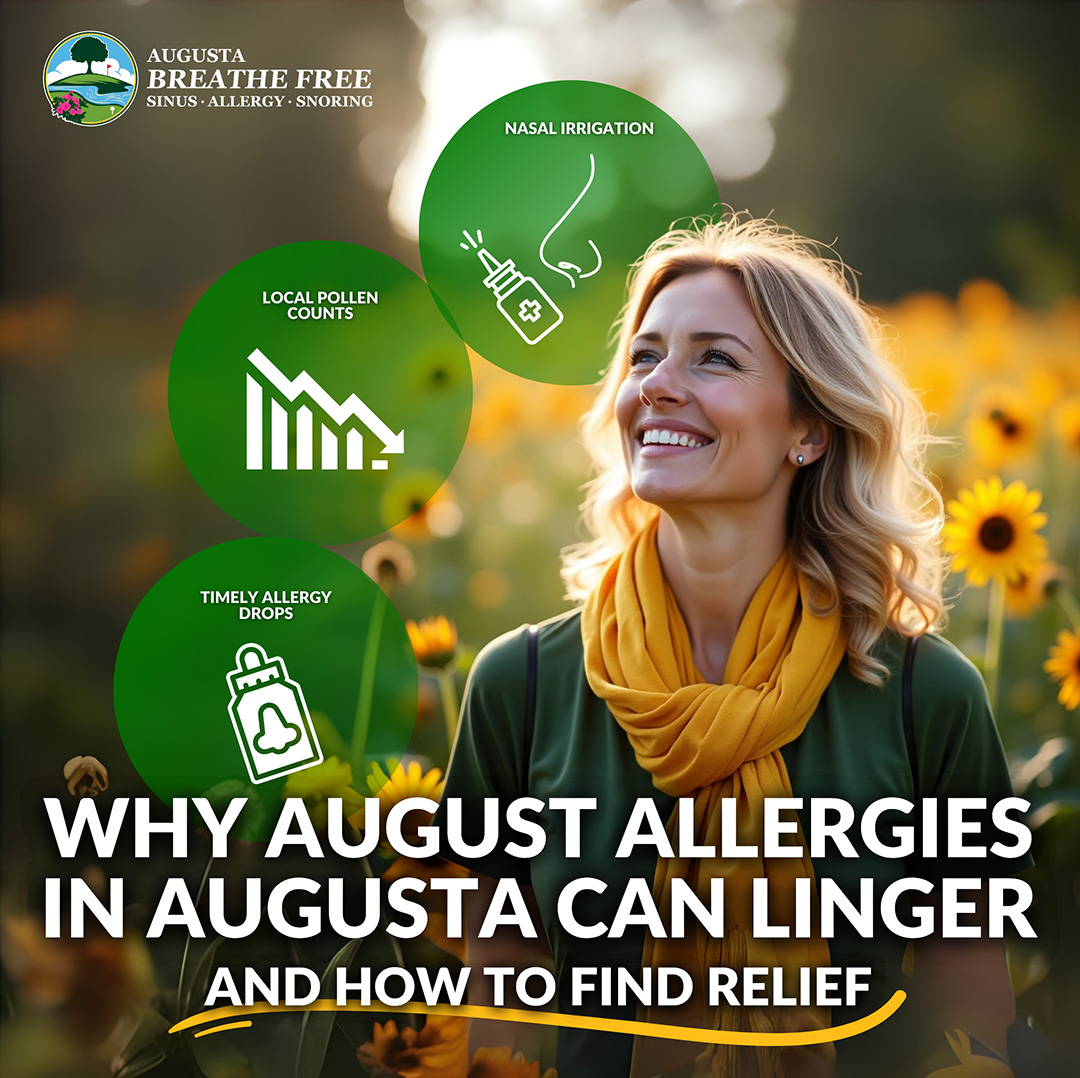Why August Allergies in Augusta Can Linger
And How to Find Relief

Living in Augusta, Georgia, means enjoying mild winters and long growing seasons. While this climate supports beautiful landscapes, it also contributes to persistent seasonal allergies that can be especially noticeable in late summer.
If your allergy symptoms seem to drag on through August, two common culprits are usually to blame:
- Ragweed pollen – Ragweed season peaks in late summer, and its lightweight pollen can travel for miles through the air.
- Mold spores – Augusta’s naturally high humidity provides an ideal environment for mold growth, especially as we move into the fall season.
This combination can make sneezing, congestion, itchy eyes, postnasal drip, coughing, and headaches a regular occurrence for many Augusta residents.
Tips for Managing Seasonal Allergies in Augusta, GA
The good news is that with the right strategies, allergy symptoms can often be reduced. Here are some evidence-based tips for families and professionals in Augusta:
✅ Get Tested for Allergies
The first step in effective allergy management is identifying your specific triggers. Allergy testing helps determine what allergens are affecting you, which allows your provider to recommend targeted treatment options.
✅ Take Preventive Medications
If prescribed by your allergist, start allergy medications two to four weeks before peak season for the best effect. Continue taking them consistently—especially on high pollen count days.
✅ Monitor Local Pollen Counts
Use resources like Pollen.com or weather apps to track daily pollen and mold levels in Augusta. Plan outdoor activities for times when counts are lower.
✅ Limit Outdoor Exposure During Peak Hours
Pollen counts are typically highest in the early morning and late afternoon. Try to stay indoors during those times when possible.
✅ Protect Yourself Outdoors
When you need to be outside, wear sunglasses, a hat, or a mask to reduce pollen exposure.
✅ Keep Doors and Windows Closed
Rely on your HVAC system during allergy season. Use a HEPA filter to reduce pollen and mold circulating indoors.
✅ Clean and Maintain Your Home
Vacuum and dust regularly, wash bedding often, and bathe pets after outdoor play to minimize allergens inside the home.
✅ Improve Indoor Air Quality
Use an air purifier to filter allergens and a dehumidifier to reduce excess moisture that encourages mold growth.
✅ Support Your Immune System
Stay hydrated, eat a nutrient-rich diet, and prioritize adequate sleep. Good overall health can help reduce the severity of allergy flare-ups.
✅ Try Saline Rinses
Saline sprays or rinses may help flush allergens from nasal passages and ease sinus irritation.
When to See an Allergy Specialist in Augusta
If home strategies aren’t enough—or if your symptoms keep recurring each year—it may be time to see a specialist. An allergist or ENT in Augusta can help determine the underlying causes of your symptoms and recommend treatments tailored to your needs.
Treatment options may include:
- Medical therapies (such as antihistamines, nasal sprays, or decongestants)
- Allergy immunotherapy (allergy drops or shots) – designed to gradually desensitize your immune system to triggers and potentially reduce long-term allergy symptoms
Allergy and Sinus Care in Augusta, GA
At Augusta Breathe Free Sinus & Allergy Centers, our team provides comprehensive allergy evaluations and develops personalized treatment plans for patients across Augusta and surrounding Georgia communities. If seasonal allergies are interfering with your quality of life, we’re here to help you explore safe and effective options for relief.
📍 Conveniently located in Augusta, GA.
Schedule a consultation today to learn more about your allergy profile and the treatments that may work best for you.



